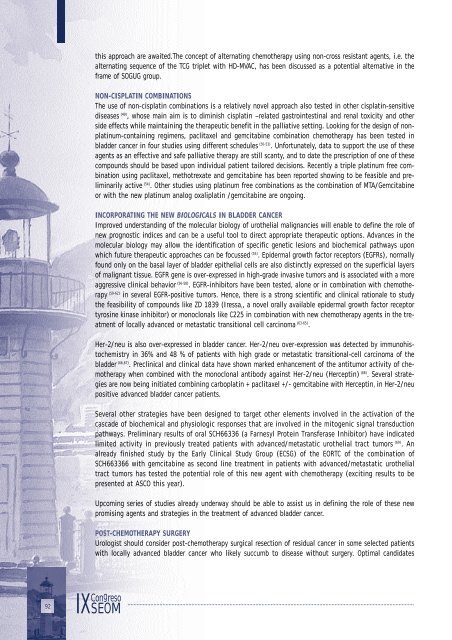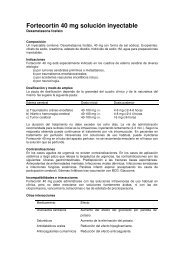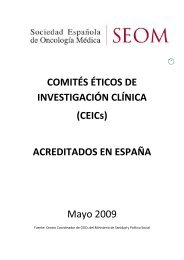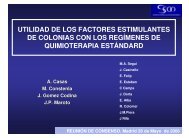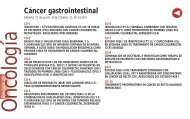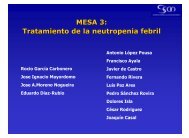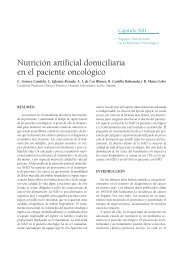Resúmenes de Ponencias - Sociedad Española de OncologÃa Médica
Resúmenes de Ponencias - Sociedad Española de OncologÃa Médica
Resúmenes de Ponencias - Sociedad Española de OncologÃa Médica
Create successful ePaper yourself
Turn your PDF publications into a flip-book with our unique Google optimized e-Paper software.
this approach are awaited.The concept of alternating chemotherapy using non-cross resistant agents, i.e. the<br />
alternating sequence of the TCG triplet with HD-MVAC, has been discussed as a potential alternative in the<br />
frame of SOGUG group.<br />
NON-CISPLATIN COMBINATIONS<br />
The use of non-cisplatin combinations is a relatively novel approach also tested in other cisplatin-sensitive<br />
diseases (49) , whose main aim is to diminish cisplatin –related gastrointestinal and renal toxicity and other<br />
si<strong>de</strong> effects while maintaining the therapeutic benefit in the palliative setting. Looking for the <strong>de</strong>sign of nonplatinum-containing<br />
regimens, paclitaxel and gemcitabine combination chemotherapy has been tested in<br />
blad<strong>de</strong>r cancer in four studies using different schedules (50-53) . Unfortunately, data to support the use of these<br />
agents as an effective and safe palliative therapy are still scanty, and to date the prescription of one of these<br />
compounds should be based upon individual patient tailored <strong>de</strong>cisions. Recently a triple platinum free combination<br />
using paclitaxel, methotrexate and gemcitabine has been reported showing to be feasible and preliminarily<br />
active (54) . Other studies using platinum free combinations as the combination of MTA/Gemcitabine<br />
or with the new platinum analog oxaliplatin /gemcitabine are ongoing.<br />
INCORPORATING THE NEW BIOLOGICALS IN BLADDER CANCER<br />
Improved un<strong>de</strong>rstanding of the molecular biology of urothelial malignancies will enable to <strong>de</strong>fine the role of<br />
new prognostic indices and can be a useful tool to direct appropriate therapeutic options. Advances in the<br />
molecular biology may allow the i<strong>de</strong>ntification of specific genetic lesions and biochemical pathways upon<br />
which future therapeutic approaches can be focussed (55) . Epi<strong>de</strong>rmal growth factor receptors (EGFRs), normally<br />
found only on the basal layer of blad<strong>de</strong>r epithelial cells are also distinctly expressed on the superficial layers<br />
of malignant tissue. EGFR gene is over-expressed in high-gra<strong>de</strong> invasive tumors and is associated with a more<br />
aggressive clinical behavior (56-58) . EGFR-inhibitors have been tested, alone or in combination with chemotherapy<br />
(59-62) in several EGFR-positive tumors. Hence, there is a strong scientific and clinical rationale to study<br />
the feasibility of compounds like ZD 1839 (Iressa‚, a novel orally available epi<strong>de</strong>rmal growth factor receptor<br />
tyrosine kinase inhibitor) or monoclonals like C225 in combination with new chemotherapy agents in the treatment<br />
of locally advanced or metastatic transitional cell carcinoma (63-65) .<br />
Her-2/neu is also over-expressed in blad<strong>de</strong>r cancer. Her-2/neu over-expression was <strong>de</strong>tected by immunohistochemistry<br />
in 36% and 48 % of patients with high gra<strong>de</strong> or metastatic transitional-cell carcinoma of the<br />
blad<strong>de</strong>r (66,67) . Preclinical and clinical data have shown marked enhancement of the antitumor activity of chemotherapy<br />
when combined with the monoclonal antibody against Her-2/neu (Herceptin) (68) . Several strategies<br />
are now being initiated combining carboplatin + paclitaxel +/- gemcitabine with Herceptin‚ in Her-2/neu<br />
positive advanced blad<strong>de</strong>r cancer patients.<br />
Several other strategies have been <strong>de</strong>signed to target other elements involved in the activation of the<br />
casca<strong>de</strong> of biochemical and physiologic responses that are involved in the mitogenic signal transduction<br />
pathways. Preliminary results of oral SCH66336 (a Farnesyl Protein Transferase Inhibitor) have indicated<br />
limited activity in previously treated patients with advanced/metastatic urothelial tract tumors (69) . An<br />
already finished study by the Early Clinical Study Group (ECSG) of the EORTC of the combination of<br />
SCH663366 with gemcitabine as second line treatment in patients with advanced/metastatic urothelial<br />
tract tumors has tested the potential role of this new agent with chemotherapy (exciting results to be<br />
presented at ASCO this year).<br />
Upcoming series of studies already un<strong>de</strong>rway should be able to assist us in <strong>de</strong>fining the role of these new<br />
promising agents and strategies in the treatment of advanced blad<strong>de</strong>r cancer.<br />
POST-CHEMOTHERAPY SURGERY<br />
Urologist should consi<strong>de</strong>r post-chemotherapy surgical resection of residual cancer in some selected patients<br />
with locally advanced blad<strong>de</strong>r cancer who likely succumb to disease without surgery. Optimal candidates<br />
92<br />
Congreso<br />
IXSEOM


